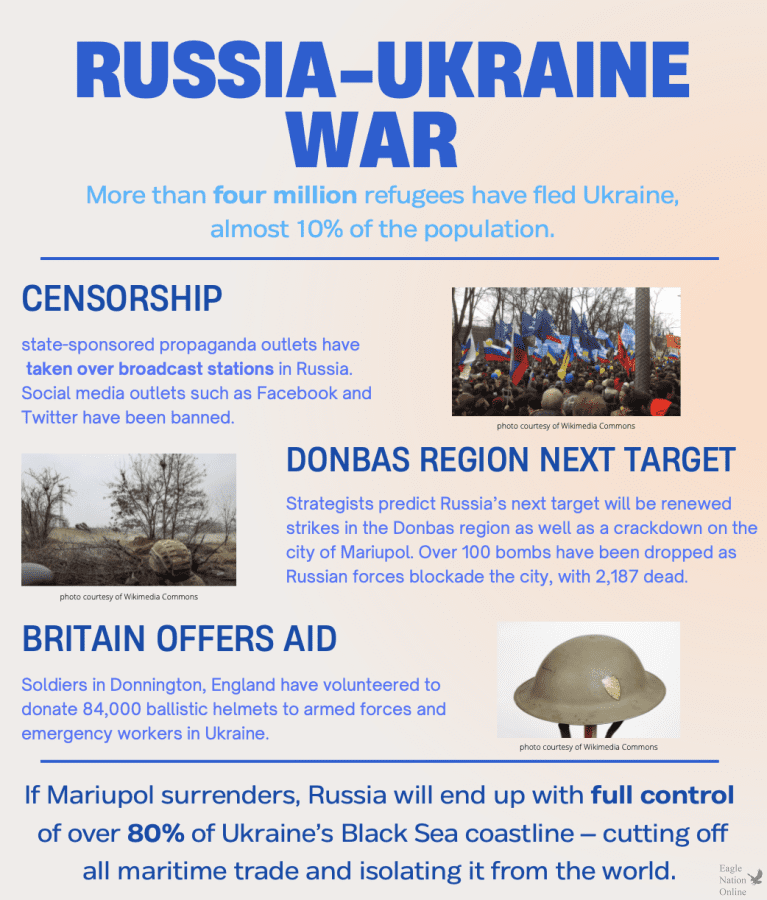Analysis Follow-Up: Russia-Ukraine war continues
An infographic made on Canva by junior and reporter Kalyani Rao summarizes the new developments of the Russia-Ukraine war. Five weeks after the start of the Russia-Ukraine war, more than four million refugees have fled Ukraine – almost 10% of the population. Most have fled to neighboring countries in the European Union, with over two million seeking safety in Poland.
April 4, 2022
This article was updated April 5 to add local student reactions.
Five weeks after the start of the Russia-Ukraine war, more than four million refugees have fled Ukraine – almost 10% of the population. Most have fled to neighboring countries in the European Union, with over two million seeking safety in Poland.
Russia censors independent broadcast stations
While Russians are not unaware of the war, state-sponsored outlets have taken over broadcast stations. According to NPR, the main viewpoint broadcasted to Russian citizens is that Russia is fighting a “humanitarian” war, where “American agents seek to deploy anti-Russian bioweapons and Ukraine’s leaders are hellbent on acquiring nuclear weapons to attack the Russian homeland.” Ukraine’s fighters are shown as “terrorists” and “rebels,” NATO is Ukraine’s “overseas master” and Russian rockets strike only military targets, as Ukrainian troops “use hospitals and residential buildings for cover.”
“Vesti Nedeli,” a Weekly News Sunday program hosted by Dmitry Kiselyov, said that Ukrainian “Nazis” are conducting a campaign of “genocide” in eastern Ukraine’s Donbas region. “It’s clear by now,” Kiselyov said. “If our troops hadn’t gone in, the Donbas would have been wiped from the face of the Earth.”
Marina Ovsyannikova, Russian Channel One employee, interrupted a live broadcast in Moscow March 14, as she held up a poster reading “No War” and condemned Moscow’s military action in Ukraine. She was later detained by authorities, and the broadcast of the station was cut immediately. Ovsyannikova is one of more than 13,000 Russian citizens who have been detained or arrested for protesting.
Russian surveys also show that 64% of Russians rely primarily on TV news stations for information.
Social media outlets Twitter and Facebook have been banned, along with the shutdown of independent broadcasting stations. Small independent broadcast station Dozhd TV was pressured to suspend its operations, going off air with a Soviet broadcast of “Swan Lake,” the Tchaikovsky ballet that some Russians now regard as a symbol of repression.
The war continues
According to AP news, Russian forces shelled Kyiv suburbs two days after the Russian government’s announcement of plans to significantly scale back operations near both the capital and the northern city of Chernihiv to “increase mutual trust and create conditions for further negotiations.”
British Defense Minister Ben Wallace has agreed to send an increased amount of lethal weapons to Ukraine for defense purposes.
Soldiers in Donnington, England volunteered to donate 84,000 ballistic helmets to armed forces and emergency workers in Ukraine. According to live updates from CNBC, the British soldiers are stripping up to 12,000 helmets a day of the U.K. insignia, along with packing batches into cardboard boxes that are ready for transport to the Ukrainian border.
Russian forces have abandoned Chernobyl, which they took Feb. 24, as soldiers began to suffer side effects shortly after digging trenches in the area. Some soldiers have been reported disobeying their orders as an act of rebellion.
“We’ve seen Russian soldiers — short of weapons and morale — refusing to carry out orders, sabotaging their own equipment and even accidentally shooting down their own aircraft,” Sir Jeremy Fleming, Director of the UK’s Intelligence, Cyber and Security Agency said on March 30.
Strategists predict Russia’s next target will be renewed strikes in the Donbas region, a territory in eastern Ukraine bordering Russia, as well as a crackdown on the city of Mariupol. According to Alijazeera.com, more than 100 aerial bombs have been dropped on Mariupol as Russian forces blockade the city, with 2,187 dead and more injured. Air strikes and raids from the ground are keeping residents trapped in Mariupol.
Geographically, Mariupol stands in the way of Russian forces coming from the Crimean Peninsula. General Richard Barrons, former commander of UK Joint Forces Command, said capturing Mariupol is “vital” to Russia’s war effort.
If Mariupol surrenders, Russia will end up with full control of over 80% of Ukraine’s Black Sea coastline – cutting off all maritime trade, and isolating it from the world.
Students shared their thoughts on how Americans are reacting to the situation.
“I think it’s devastating that people are having to uproot their lives just to survive, while people are making jokes and memes about it as if these aren’t real people,” senior Hailey Hamilton said. “There’s so much more we can do to help them – they need food and shelter.”
Others have also expressed sympathy for Ukrainians.
“The Russia-Ukraine war is devastating,” junior Henry Tolbert said. “It makes me upset to know this war is unnecessary.”

























